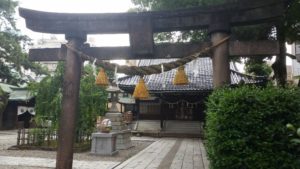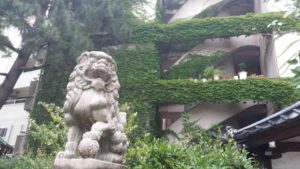So here I am. The last day. Saigo no hi. This program has been long, and always difficult, but also incredibly rewarding. Not only have I learned much more about Japanese language and lifestyle, but I have learned much more about myself, as well. Transplating onself into an entirely new environment–new in every way imaginable–almost forces introspection. During these eight weeks, I asked myself questions like: who am I? What am I capable of? What do I truly feel connected to?
Last week, I talked about a certain listlessness and sense of disconnect from my studies. Now writing after that crag has been crossed, I can say that I was truly confronted with many doubts about my studies, my future, my personal ability. And in the week that followed, every day, every experience was another reflection directed at finding a way to calm these doubts.

Though a final exam ate into this week’s schedule like an insatiable time-fiend, time was made for recognizing and affirming those connections made over eight weeks. I spent time with friends made through the program. I visited the places in Kanazawa that felt particularly special. And, of course, I spent evenings with my host-family.
Perhaps due to a choice that was too cliche, I also had a sushi lunch. In Kanazawa Eki, the large and well-known train station of Kanazawa, there is a sushi restaraunt tucked into a back corner, a pocket of great, traditional food.
Though I did not need to confirm the importance of sushi to Japanese culture (because what foreigner does not connect sushi and Japan in the space of a breath?), talking with people at the restaraunt did reveal some interesting information. For example, even though one may be in Japan, and the sea seems always close-at-hand, some areas are much better for sushi than others. Saying nothing about bias, people I talked with at the sushi-restaraunt regard Kanazawa as the place for sushi. The sea is incredibly close, so close that the sushi’s freshness cannot really be beat. Someone told me that even Tokyo sushi is not as fresh, a comment I hesitantly took as truth (because what do I know?).

What I particularly enjoyed about the restaraunt was its openness. The sushi chefs stand right the counter, slicing various fish and plating them on plumps of sticky rice. Customers can interact with the chefs directly, an exchange that I feel demonstrates the seriousness and attraction with which Japanese traditionally treat sushi. The nature of sushi is–and I may be stretching here–akin to that of wine; the origin, the preparation, the atmosphere are all key in the appreciation of sushi. Which is to say nothing on just how Japanese a food like sushi is, composed of two of Japan’s most consumed foods: fish and rice.
Needless to say, eating sushi in such a restaraunt, hiding away in Kanazawa Eki, was definitely the kind of Japanese experience befitting a final week.
Later today, I leave Japan. Not for long, admittedly (I am returning in the Fall for a fuller study abroad experience), but the idea of leaving Ishikawa after spending so much time here, being so challenged in so many ways, is a strange one. I am so thankful to the people that not only helped me learn Japanese, but helped me feel a part of this country and its culture.
One day, I will return. And I will continue my studies. And I will only grow closer to a country I already love.
Joshua Kuiper
カイパーヨシュア
